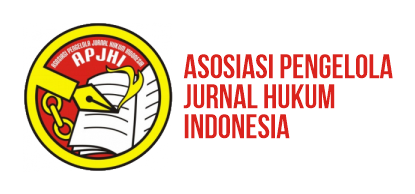The Expansion of Legal Application of Military Law on Legal Subjects that Equated with the Military Based on Republic of Indonesia Law
Main Article Content
Ilman Hadi*
Irwan Triadi
Parluhutan Sagala
A nation as an entity needs a way to maintain its existence as best as possible through its own capabilities through a national military formed to carry out national defense duties. Generally, the term "military" refers only to active and organic military personnel. Subsequently, a group of individuals legally equated with the military emerged. During President Soekarno's administration, Indonesia implemented compulsory military service to encourage greater public involvement in the armed forces. Currently, there are also other groups considered military, including student soldiers, titular military personnel, and citizens mobilized as reserve component troops. The increase and expansion of the number of individuals considered military has an impact on the application of military law, as they are included within the military legal system. The theory of legality is used to analyze this issue qualitatively. The Ministry of Defense is obligated to foster and develop military law in Indonesia, including all military legal entities. Without clear regulations on the application of military law, issues of military judicial jurisdiction over individuals legally equated with the military will arise.
Barbey, C. (2015). Non-militarisation: countries without armies. Identification Criteria and First Findings. Mariehamn, Åland, Finland.
Budiana, M., & Djuyandi, Y. (2022). Military Position Transition In Every Era Of Indonesian Head Of State Leadership. Journal of Governance, 7(1). https://doi.org/10.31506/jog.v7i1.14567
Heniarti, D. D. (2017). Sistem peradilan militer di Indonesia: tinjauan teoritis, praktis, perbandingan hukum & pembaruan hukum nasional. Diterbitkan & dicetak oleh PT Refika Aditama.
Jonsson, E., Salo, M., Lillemäe, E., Steder, F. B., Ferst, T., Kasearu, K., Novagrockiene, J., Österberg, J., Sederholm, T., & Svensén, S. (2024). Multifaceted conscription: A comparative study of six European countries. Scandinavian Journal of Military Studies.
Lubis, T. M., Buaton, T., Lubis, A. F., & Sagala, P. (2021). Penegakan Hukum dalam Mengadili Anggota Militer yang Melakukan Tindak Pidana Umum dalam Perspektif Kepentingan Militer. CENDEKIA: Jurnal Ilmu Sosial, Bahasa Dan Pendidikan, 1(4), 86–95.
Morillo, S. (2017). What is military history? John Wiley & Sons.
Péter, S. (2018). “Nullum crimen nulla poena sine praevia lege poenali?” Evaluation of c. 1399/CIC’83 in the Light of the ius vigens orientale. Eastern Canon Law, 7(1–2), 319–342.
Pramono, B. (2020). Peradilan Militer Indonesia. Scopindo Media Pustaka.
Reza, B. I., Junaidi, J., & Marpaung, R. (2007). Reformasi Peradilan Militer di Indonesia. Imparsial. Jakarta.
Riza, M. F. (2020). Civilian Control of The Military in The Post-New Order Indonesia. International Journal on Social Science, Economics and Art , 10(1).
Sagala, P., & Ferdian, F. (2017). Yurisdiksi peradilan militer dalam kekuasaan kehakiman di Indonesia. E-Journal Peradilan Militer, 1–20.
Savcic, R., Theodoropoulos, N., & Xefteris, D. (2023). Conscription and educational outcomes. Journal of Population Economics, 36(4), 2799–2824.
Soekanto, S., & Mamudji, S. (2016). Penelitian Hukum Normatif Suatu Tinjauan Singkat. Rajawali Press.
Subihat, I., & Djundan, M. (2023). Kompetensi Peradilan Militer Dalam Sistem Peradilan Pidana Indonesia.
Tambunan. (2005). Jakarta: Pusat Studi Hukum Militer. Sekolah Tinggi Ilmu Hukum Militer.















